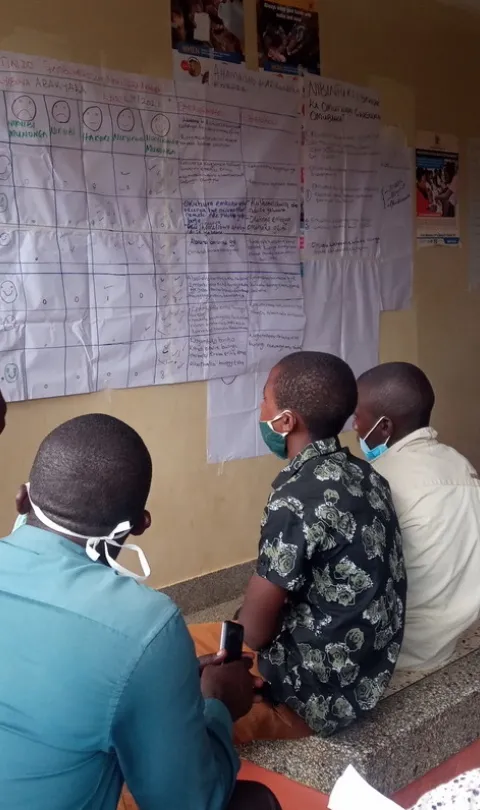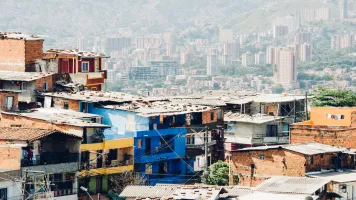Ntwetwe is a small farming community in the Central Regional of Uganda, located 140km from the capital Kampala. Residents predominantly engage in matooke (green plantains) farming. Luganda is the native language.
Before the COVID-19 outbreak, community members had always walked to the nearby clinics to access skilled health care providers. For referrals and more specialised services, they simply jumped onto the motorcycles - commonly known as bodabodas - to the district hospital which is over an hour away. Children went to school every day where they were kept engaged, felt safe and protected from violence.
Life was uninterrupted. Life was ‘normal’ until the announcement of the countrywide lockdown and restriction of movement by the government to bring down the COVID-19 infection rates.
With this directive, everything came to a standstill like a frozen movie. All schools were closed, all passenger service and private vehicles stopped, and a curfew imposed; the stay-at-home order became mandatory.
But to every action, there is an equal opposite reaction — undesired consequences. This was true of the government interventions to control the pandemic. Children were exposed to increased violence, including child neglect, domestic violence, child labour, and physical sexual abuse. The measures also hindered pregnant women and new mothers and their babies from accessing essential health services, such as antenatal care and immunization.
Aware of the far-reaching impact of the lockdown on their wellbeing, community members in Ntwetwe led by Alex Makumbi approached the district COVID-19 taskforce to address what they termed the ‘emerging critical issues’. Alex is one of the community members who had been earlier trained in World Vision’s local level advocacy and social accountability approach that facilitates dialogue between communities and government in order to improve service delivery.
The Citizen Voice and Action (CVA) is a social accountability approach that works by educating citizens about their rights and equipping them with a structured set of tools designed to empower them to provide feedback and spaces to engage in constructive dialogue and collective action with duty bearers to protect and enforce those rights. World Vision is facilitating CVA across communities on different themes and sectors in up to 50 countries, with adaptation for fragility, urban and other factors.
Through CVA, citizens apply experiences and use feelings to generate vital data about quality and quantity of services provided to them. Communities then utilize the findings from the citizen generated data to engage local government in developing actionable plans and commitments aimed at improving services.
“The COVID-19 pandemic does not discriminate,” says Alex. “It does not stop for people living in poverty, under the constant unjust system. It does however put into sharp perspective the catastrophic impact of failing to protect the most vulnerable in times of crisis.”
Alex now says their participation in the CVA training was a timely divine blessing. "When we were approached by World Vision to take part in the CVA training, we were not different from the people of Noah’s time. We were hesitant because we didn't know what it was all about. But after the outbreak of COVID-19 and the government response, now we realise we did not waste our time. We would have given up had World Vision not introduced the CVA approach to us.”
For community development to occur, community members must be knowledgeable about their role. In line with this, World Vision, through its advocacy and campaigns, empowered Ntwetwe community members to advocate for exceptions to the government directives and flexibility from the local authorities.
“With the lockdown, life and everything everywhere was locked,” says Winfred Ongom, the Social Accountability Coordinator at World Vision in Uganda. “It was a wrong assumption that one size fits all because there were people who needed to access life-saving services. Pregnant mothers needed to attend antennal and to deliver at the health facilities. Sick people needed to see the doctor and so on.”
Equipped with skills and knowledge on how to engage the authorities, Ntewtwe community members did not hesitate to voice their realities. They divided themselves into groups of men, women and youth. Afterwards, the community selected seven of the members to become the CVA committee members.
“We knew COVID-19 pandemic was impacting all of us, but it was particularly severe for the most vulnerable children, their families and communities that were already struggling to get by before the pandemic hit,” says Alex. “Our immediate task was to develop an action plan based on data and information from the community members to petition the district COVID-19 taskforce. We are happy the authorities responded and allowed special categories of people, including the sick persons, pregnant women, mothers and children to seek health services.”
It is not normal for a pregnant woman to walk 20km to reach the closest community health centre. It is not normal to have one community of more than 5,000 inhabitants with no community health centre around. It is not normal that a community health centre operates without a doctor and a midwife. The lists of abnormal things that do happen in communities like Ntwetwe are unfortunately so many.
But Alex and his CVA committee are not giving up. Neither are they losing hope. “We don’t want to go down,” says Alex. “We must keep holding on in faith because if we lose hope, we lose out. We must trust that beyond the cloud, the sun still shines and beyond the bend, the road continues for us to ensure we leave no one behind.”
World Vision is present in 49 districts across Uganda working with children, their families and communities to address the root causes of poverty and injustice through our interventions in health, livelihoods, education and protection. Through CVA many communities, like Ntwetwe, are succeeding at influencing and lobbying authorities in a more civil way and still get results. The ‘An Unequal Pandemic’ report developed by a Civil Society Collaborative on Inclusive COVID-19 Data highlights some of the insights from CVA in Ntwetwe.
“Even with the second lockdown, we see a growing number of pregnant women and mothers going for antenatal and post-antennal care. We wouldn’t be seeing this had it not been for CVA. We are succeeding because [World Vision] invested in teaching us how and giving us the tools—knowledge and skills—to do it ourselves. Thank you for standing with us. May we be to others what you have been to us,” says Alex.
-
Winfred Ongom and Stephen Watulo are Social Accountability Coordinators, Charlotte Muhwezi is the Business Development Officer, and Fred Ouma is the Communications and Development Coordinator at World Vision Uganda.

